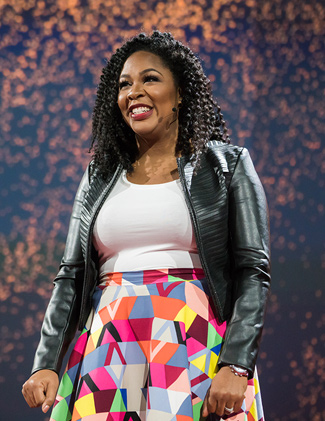
Observational astrophysicist Jedidah Isler – a postdoctoral fellow at Vanderbilt University and the first African American woman to receive a Ph.D. in astrophysics from Yale – has been selected as a member of the National Geographic Society’s 2016 class of Emerging Explorers.
This is a group of 13 individuals from around the globe that the society has chosen for their unconventional thinking and innovations that are changing the world for the better. According to National Geographic, “The Emerging Explorers Program recognizes and supports uniquely gifted and inspiring scientists, conservationists and innovators who are at the forefront of discovery, adventure and global problem solving while still early in their careers.”
Each Emerging Explorer receives a $10,000 award to aid further research and exploration.
Isler studies celestial objects that are hard to even imagine, much less scientifically explore. Her specialty is blazing quasars, or blazars: supermassive, hyperactive black holes in distant galaxies. She is featured in the cover story of the spring issue of Vanderbilt Magazine.
Isler was a member of the original cohort accepted into the Fisk–Vanderbilt Master’s-to-Ph.D. Bridge program, a partnership begun in 2004 with Nashville’s acclaimed historically black Fisk University and designed to increase the number of women and underrepresented minorities earning doctorates in science. Today the program has the distinction of being the nation’s top awarder of Ph.D.s to underrepresented minority students in physics, astronomy and materials science.
In 2014, Isler received her Ph.D. from Yale’s astronomy program. Starting last fall, she returned to Vanderbilt as a National Science Foundation postdoctoral fellow in Vanderbilt’s Department of Physics and Astronomy.
In addition to her academic pursuits, Isler has emerged as an increasingly high-profile advocate for diversity among science, technology, engineering and mathematics (STEM) researchers.
A popular TED speaker, she wrote a widely discussed New York Times opinion piece – “The ‘Benefits’ of Black Physics Students” – last fall about the need for more black physics students in the wake of questioning from U.S. Supreme Court Chief Justice John Roberts as part of a case about race-conscious college admissions.
Isler also hosts a monthly Google hangout called “Vanguard: Conversations with Women of Color in STEM,” in which she interviews other minority women about their careers as science and math researchers.